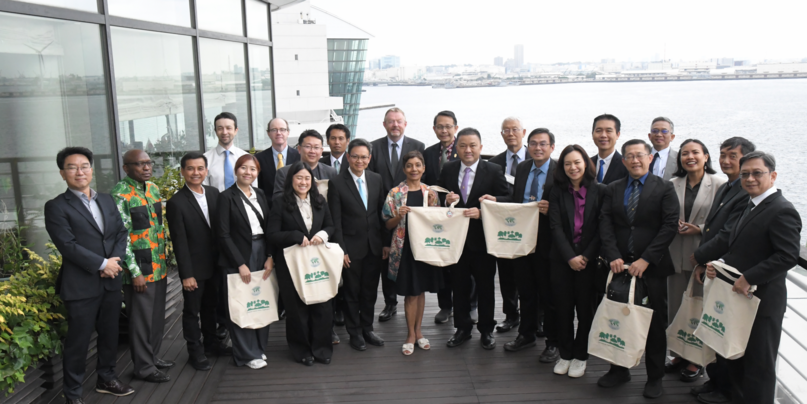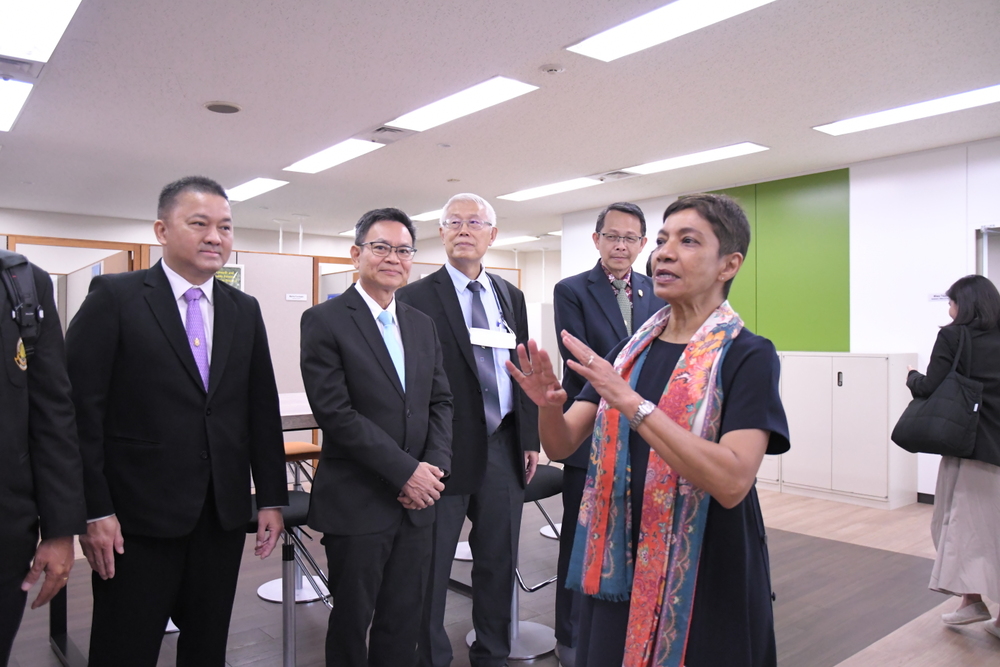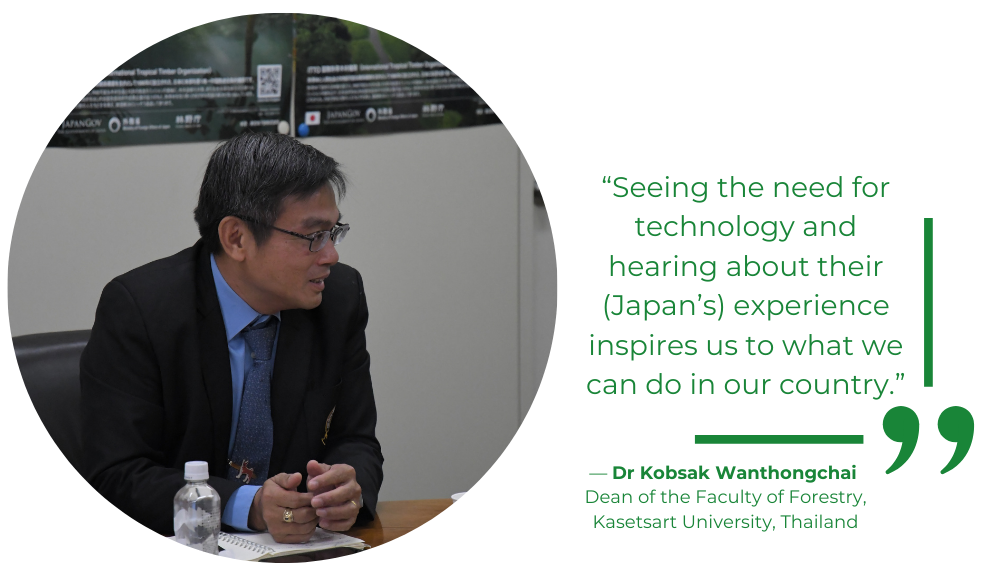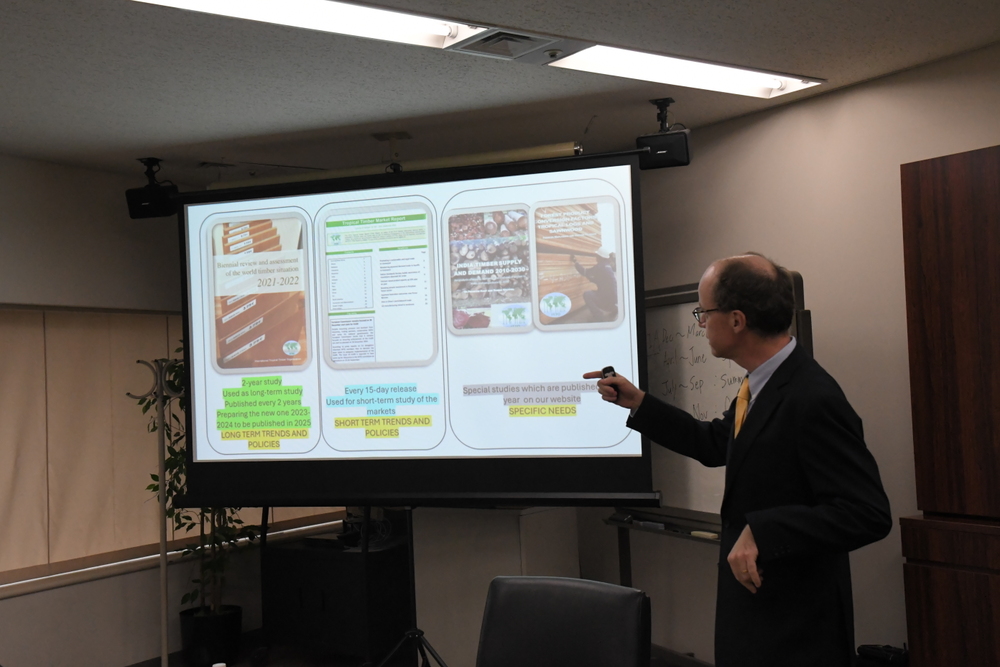Boosting Thailand’s domestic wood consumption: ITTO’s collaborative effort with Thailand and Japan
2024-10-28

The COVID-19 pandemic has shaken global markets, including tropical timber trade. Like many other countries, Thailand saw a significant decline in international demand for timber and its prices. In response to this challenge, the International Tropical Timber Organization (ITTO) and the Forestry Agency of Japan have promoted a key solution: boosting Thailand's domestic consumption of wood and wood products.
Why domestic consumption matters
With the volatility of global timber markets, strengthening Thailand's domestic wood industry is more critical than ever. Encouraging local consumption of wood products could reduce dependence on fluctuating international markets and support the country's long-term economic and environmental sustainability.
One major step in this direction is improving wood legality and sustainability policies, stakeholder engagement, and strengthening the timber supply chain. As Thailand looks ahead, Japan's success in promoting domestic wood consumption offers valuable lessons.

Japan's model: a blueprint for success
Japan has long been a leader in sustainable wood consumption, primarily through policies that support small-scale enterprises. Their approach to promoting wood and wood product use has yielded significant economic and environmental benefits.
“We are here to learn about Japan’s efforts in promoting wood use,” says Dr. Kobsak Wanthongchai, Dean of the Faculty of Forestry at Kasetsart University.
Learning from Japan's experience offers a roadmap for Thailand to develop similar frameworks that encourage local businesses and communities to embrace wood as a sustainable resource. “Seeing the need for technology and hearing about their (Japan’s) experience inspires us to what we can do in our country,” he added.
The Thailand-Japan collaboration
The Thai delegation's visit to Japan, led by the Deputy Director General of the Royal Forestry Department and the Dean of Kasetsart University's Forestry Faculty, aims to strengthen collaboration between Thai and Japanese government agencies and learn from Japan’s forest industry.
The visit focuses on promoting sustainable wood use, improving domestic policies, enhancing production capacity, and supporting decarbonization efforts, with projects funded by the Japanese government targeting Southeast Asian countries. The international collaboration is part of the ITTO Project: Promotion of Sustainable Domestic Consumption of Wood Products in Thailand (PD 926/22 Rev.1), with support from Kasetsart University.
As part of the visit to Japan, the ITTO Secretariat welcomed a 19-person Thai delegation to its headquarters in Yokohama on October 17, 2024. The group comprised representatives from Thailand's public, private and academic sectors - the Royal Forest Department of Thailand, Forest Industry Organization, Kasetsart University, and SCG Cement-Building Materials Co., Ltd.
Thailand’s active role in ITTO, with the presence of past and current focal points, was acknowledged during the meeting. ITTO Executive Director Sheam Satkuru expressed huge appreciation for Thailand hosting the 59th Session of the International Tropical Timber Council (ITTC) held in Pattaya. And she is “looking forward to receiving high-ranking Thai officials at the 60th ITTC Session in Yokohama.”

Enhancing data reporting
Acknowledgments were made to key ITTO figures and the Thai government for hosting the successful ITTC-59th. The visit also promotes sustainable wood use and legal supply chains under ITTO's flagship Program Line: Legal Sustainable Supply Chains (LSSC), with Japan-funded projects targeting Southeast Asia. These projects, including the sustainable wood use (SWU) and Regional Teak Project, aim to improve domestic policies, production capacity, and stakeholder skills, and support decarbonization efforts. Thailand’s SWU project is expected to conclude by early 2025.
ITTO values visits and in-person interactions with its member countries, such as Thailand, as they provide a vital platform for sharing the organization's work and exploring ways to enhance service delivery. ITTO’s Sheam Satkuru is eager “to the planned training workshop on project formulation.” “This is an important capacity-building program for our membership,” she added.
The discussions were highly productive during the visit, focusing on accurate timber production and trade reporting. The group examined the common challenges countries face in collecting and reporting these essential statistics. Thailand, as the newest member of the Global Timber Index (GTI), expressed a keen interest in improving data accuracy through understanding the reporting process for gathering data from both the public and private spheres.
The delegation and ITTO representatives discussed potential solutions, including the idea of hosting technical workshops to help member countries refine their data collection and reporting practices. These workshops would provide practical guidance and ensure more consistent and transparent reporting. This exchange marks a significant step in enhancing timber production and consumption statistics.

What's next for Thailand?
By learning from Japan's experience and success in promoting wood products domestically, Thailand can strengthen its wood industry for the future. This collaboration promises to foster sustainable forestry practices, enhance the local economy, and ensure the long-term viability of Thailand's timber resources.
“We are flying home with a lot of learning to pack and to bring back home and implement it in Thailand’s forestry sector,” Mr.Bannaruk Sermthong, Deputy Director General of the Royal Forest Department of Thailand, shared during the meeting.
The ongoing partnership between Thailand, Japan, and ITTO represents a significant step toward sustainable wood consumption. The lessons learned will likely serve as a model for other tropical timber-producing nations looking to strengthen their domestic markets.
ITTO will continue working with Thailand and its member countries to improve statistical data on timber production and trade, ensuring the delivery of relevant and reliable statistics that will provide a good foundation for policy and decision-making in the forestry sector.